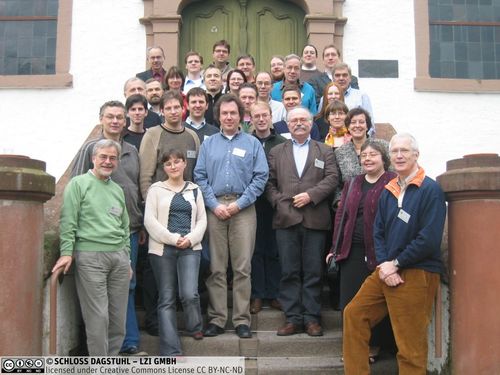Dagstuhl-Seminar 06491
Digital Historical Corpora – Architecture, Annotation, and Retrieval
( 03. Dec – 08. Dec, 2006 )
Permalink
Organisatoren
- Lou Burnard (University of Oxford, GB)
- Milena Dobreva (Bulgarian Academy of Sciences, BG)
- Norbert Fuhr (Universität Duisburg-Essen, DE)
- Anke Lüdeling (HU Berlin, DE)
Kontakt
Press Release
"Digitalisierung von historischen Texten" 27.11.06 (German only)
The seminar brought together scholars from (historical) linguistics, (historical) philology, computational linguistics and computer science who work with collections of historical texts. These texts or digital libraries or corpora1 are collected for a number of different purposes such as lexicography, history, linguistics, philology etc. This, naturally, leads to different decisions in their design and architecture.
The purpose of this seminar was twofold: First we wanted to inform each other about the decisions each of us had taken in building a historical corpus and discuss the options. Second, we wanted to build an international network of people working with historical corpora and explore the options for further partnerships or projects. We think that both goals were reached.
The seminar was very interesting and stimulating. In the final discussion of the workshop, a ‘grand picture’ of the research issues in the area of digital historic corpora was developed (see Figure 1). Here the arcs represent enabling/supporting methods. As can be seen from this picture, the major goal is the research on large historical corpora, which requires work on the areas pointing to it directly or indirectly. A researcher’s workbench should support personalization, collaboration as well as problem solving. It must be complemented by tools for the annotation and the analysis of corpora, as well as providing functions for visualization, browsing and retrieval (especially for spelling variants). These methods should first be applied to and tested on small corpora, before they can be used for large corpora. In this context, evaluation also plays a major role. For large corpora (stored in digital libraries), the choice of an appropriate architecture is a crucial issue.
Another issue that was of interest to all participants is quality control and standardization.
- Victor Baranov (Izhevsk State Technical University, RU)
- Lou Burnard (University of Oxford, GB)
- Gregory R. Crane (Tufts University, US) [dblp]
- James Cummings (Oxford University Computing Services, GB)
- Mark Davies (Brigham Young University, US)
- Mila Dimitrova-Vulchanova (NTNU - Trondheim, NO)
- Milena Dobreva (Bulgarian Academy of Sciences, BG) [dblp]
- Karin Donhauser (HU Berlin, DE)
- Eva Dyllong (Universität Duisburg-Essen, DE)
- Astrid Ensslin (The University of Manchester, GB)
- Tomaz Erjavec (Jozef Stefan Institute - Ljubljana, SI) [dblp]
- Andrea Ernst-Gerlach (Universität Duisburg-Essen, DE)
- Stefan Evert (Universität Osnabrück, DE) [dblp]
- Jean-Daniel Fekete (University of Paris South XI, FR) [dblp]
- Norbert Fuhr (Universität Duisburg-Essen, DE) [dblp]
- Kurt Gärtner (Universität Trier, DE)
- Markus Heller (LMU München, DE)
- Karin Hess (MPI-SWS - Saarbrücken, DE)
- Nikola Ikonomov (Bulgarian Academy of Sciences, BG)
- Fotis Jannidis (TU Darmstadt, DE) [dblp]
- Jaap Kamps (University of Amsterdam, NL) [dblp]
- Alexander Karosseit (HU Berlin, DE)
- Meike Klettke (Universität Rostock, DE)
- Ulf Leser (HU Berlin, DE) [dblp]
- Anke Lüdeling (HU Berlin, DE)
- Wolfram Luther (Universität Duisburg-Essen, DE) [dblp]
- Manfred Markus (Universität Innsbruck, AT)
- Roland Meyer (Universität Regensburg, DE)
- Thomas Pilz (Universität Duisburg-Essen, DE)
- Paul Rayson (Lancaster University, GB)
- Klaus U. Schulz (LMU München, DE)
- Thorsten Vitt (TU Darmstadt, DE)
- Andreas Witt (Universität Tübingen, DE)
- Amir Zeldes (HU Berlin, DE) [dblp]
Klassifikation
- Interdisciplinary (Computer Science
- Computational Linguistics
- Corpus Linguistics
- Literacy
- Bioinformatics) Own Categories: Corpus architecture
- Processing and representing multilingual and multimodal parallel text corpora
- Annotation standards
- Retrieval facilities in multilevel hypertext
Schlagworte
- Corpus architecture
- annotation standards
- multilingual
- multimodal corpora
- fuzzy search
- multilevel hypertext


